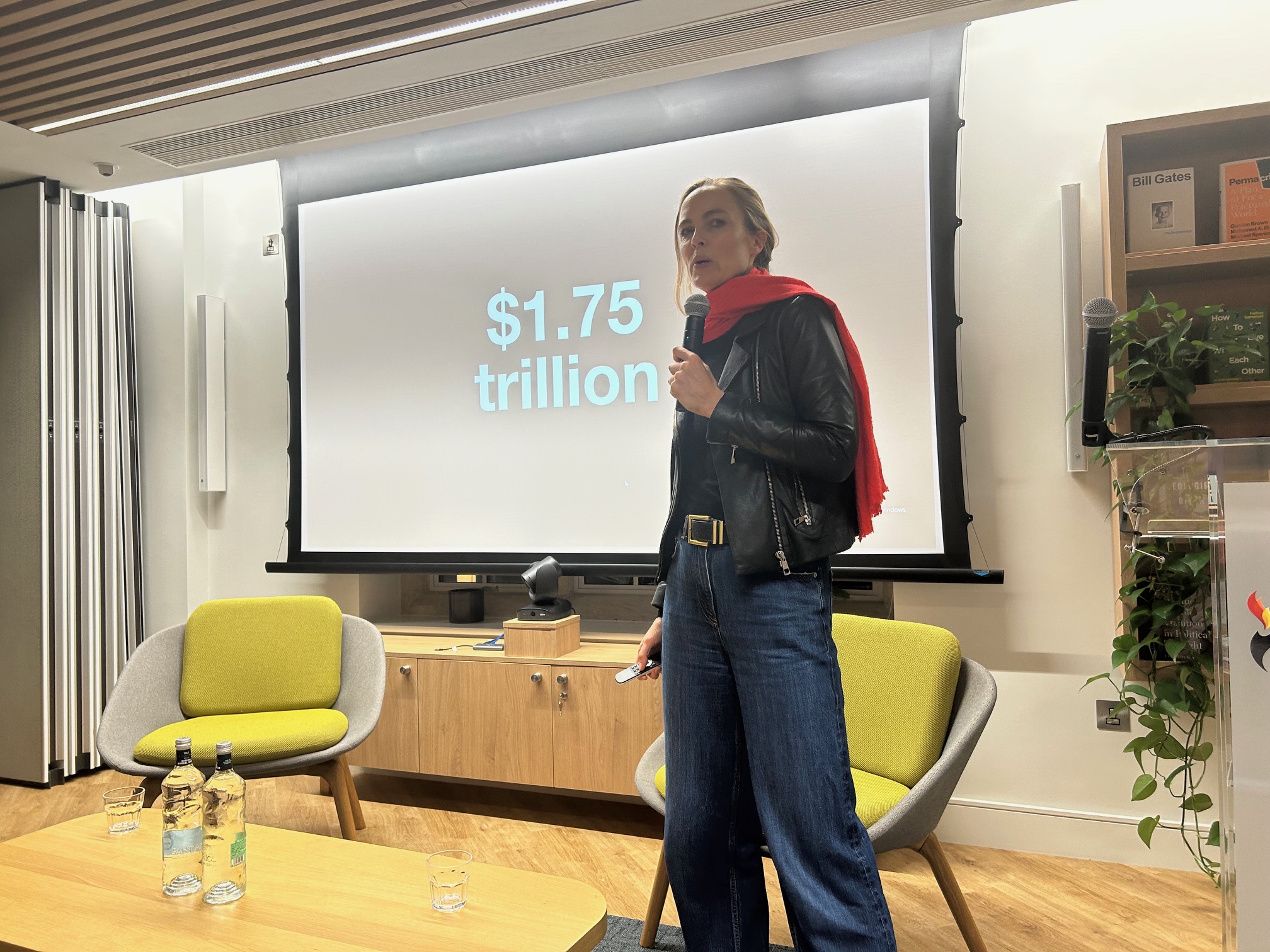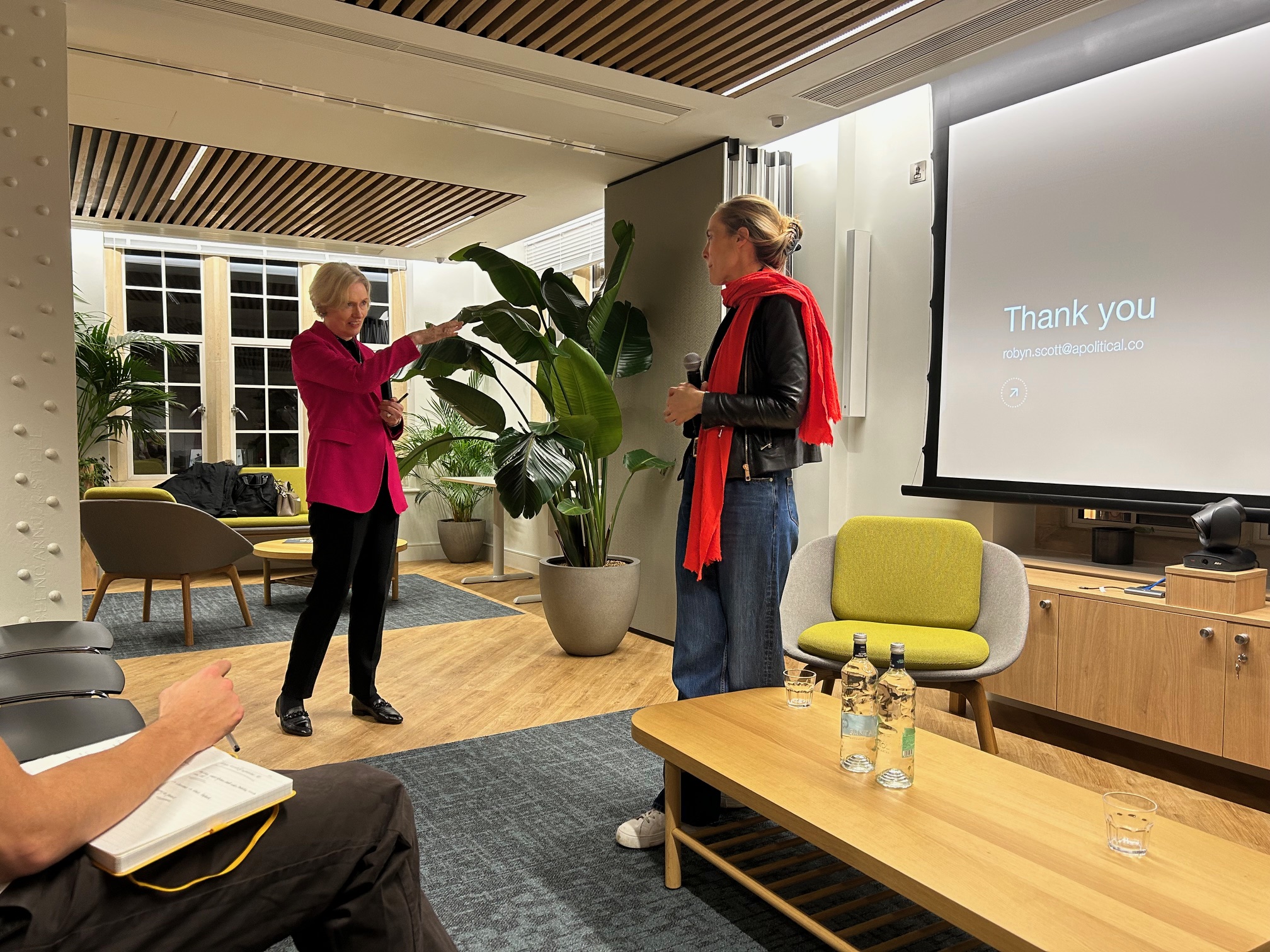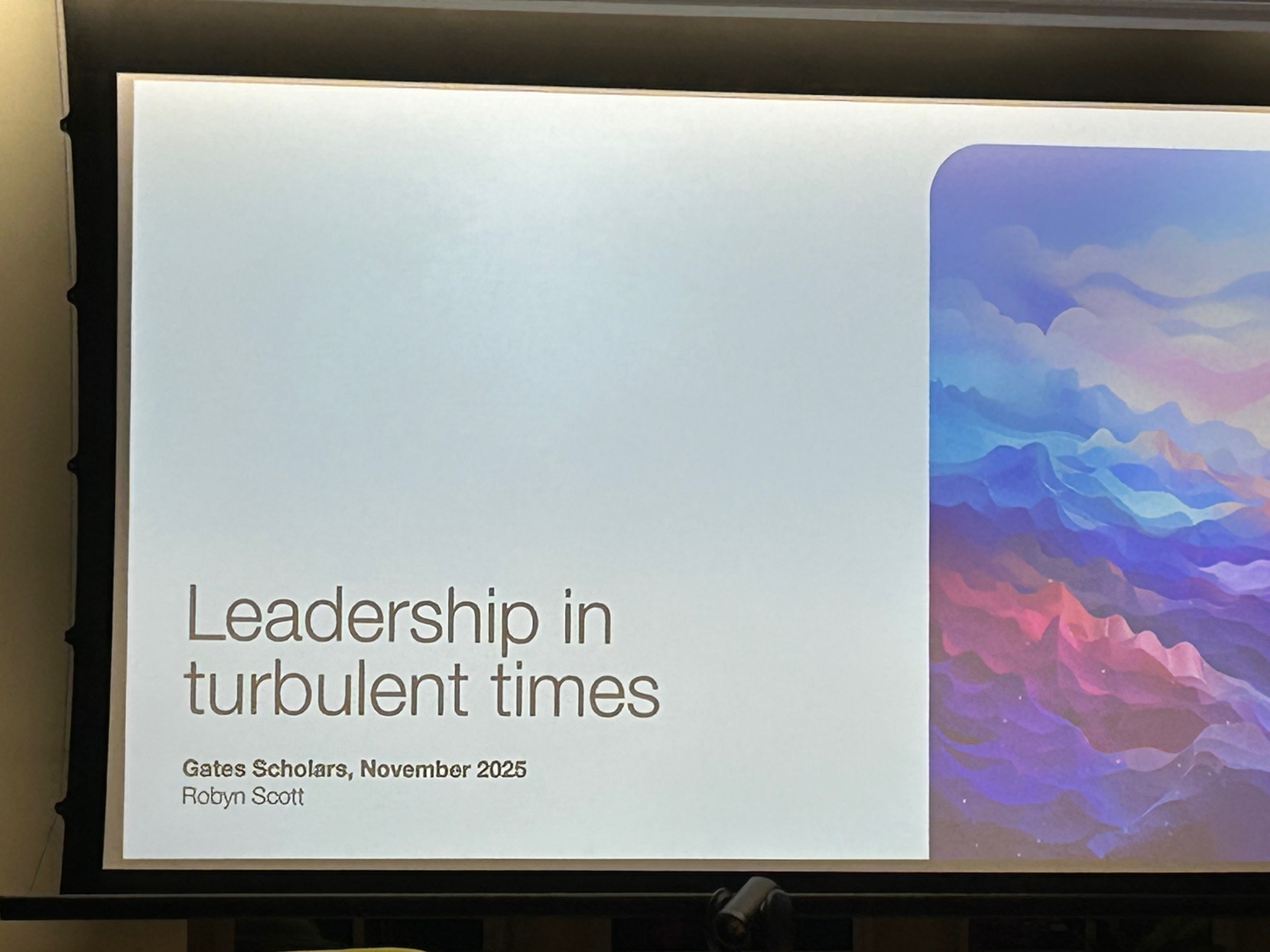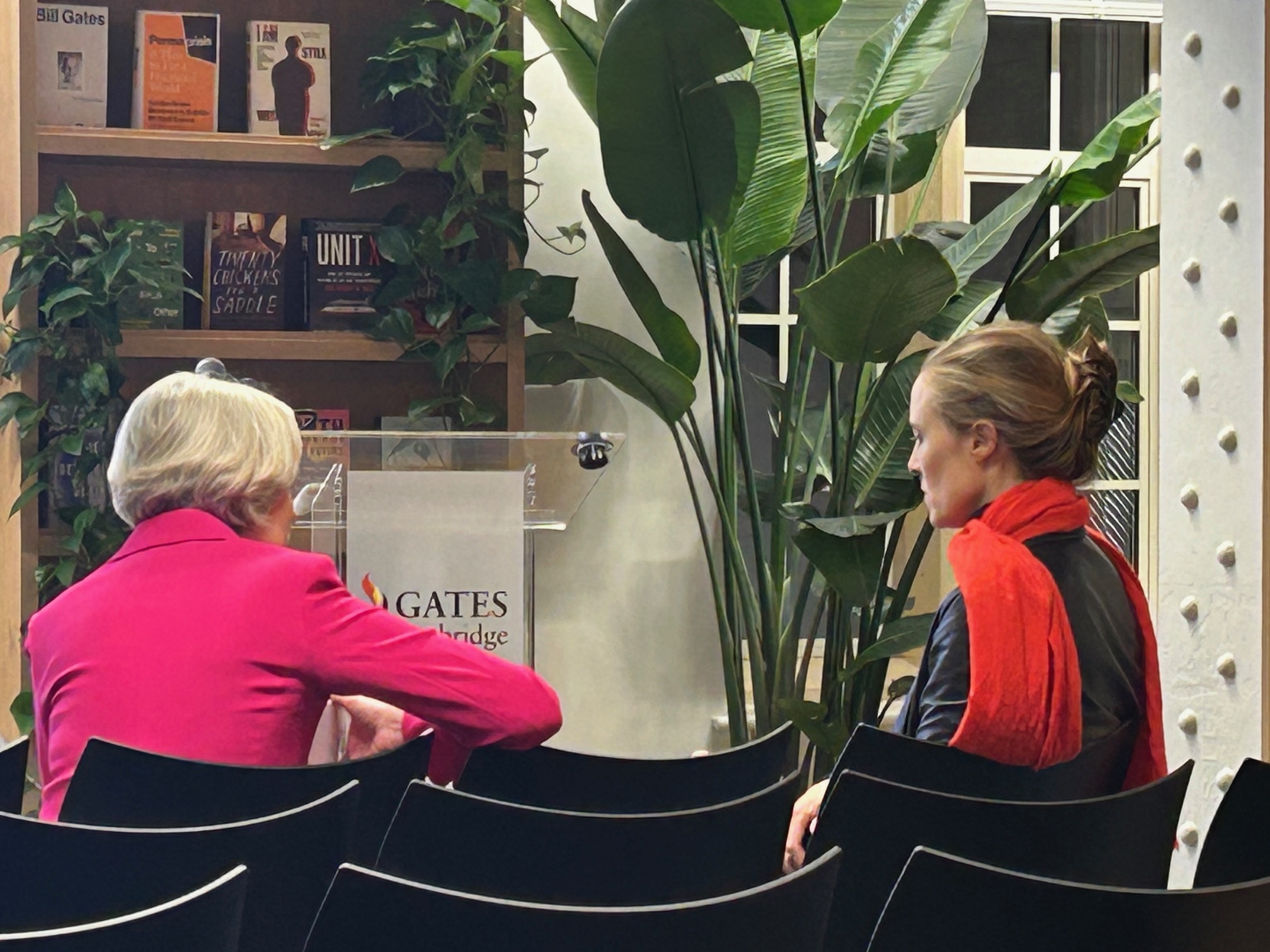
Robyn Scott, CEO of Apolitical, gave a talk to Gates Cambridge Scholars this week about the need to fill the vacuum in moral leadership and how we do that.
Democracies have lost their way of telling stories about the future which celebrate risk and opportunity.
Robyn Scott
History is plastic and leaders have more agency today than they may have tomorrow so it is vital that they use it courageously to build a better future, the co-founder of Apolitical – a global learning platform for government – told Gates Cambridge Scholars last night.
Speaking as part of Gates Cambridge’s series of talks on leadership, Robyn Scott [2004], a Gates Cambridge Scholar herself and founder of Apolitical, said that we are at a fork in the road when it comes to where the world is heading: “We are going to pick a direction and will be less malleable at some point, but now we can be flexible. Small groups of good people can achieve things. Leaders matter more than ever and courage is contagious.” She advised future leaders to “hang out with people who are fighting big fights” to fortify their own moral courage.
 Scott [pictured right with Gates Cambridge Provost Eilís Ferran] spoke of her own life story, starting from her childhood growing up in Botswana where her father was a flying doctor. She spoke of risk-taking as a child, for instance, swimming across crocodile and hippo-invested rivers. She said that, looking back, that childhood had prepared her well for being an entrepreneur, especially for founding non-normative businesses.
Scott [pictured right with Gates Cambridge Provost Eilís Ferran] spoke of her own life story, starting from her childhood growing up in Botswana where her father was a flying doctor. She spoke of risk-taking as a child, for instance, swimming across crocodile and hippo-invested rivers. She said that, looking back, that childhood had prepared her well for being an entrepreneur, especially for founding non-normative businesses.
Scott spoke about the AIDS epidemic that hit Botswana in the late 1990s when her father was treating people in clinics in the bush. That experience demonstrated the importance of good governance and about what happens when the state fails, she said. Her first book, Twenty Chickens for a Saddle, is an acclaimed memoir about her childhood against the AIDS epidemic and Scott’s MPhil at Cambridge was about differential pricing of anti-retroviral drugs.
Through her Cambridge experience, Scott co-founded OneLeap, an executive education company, with fellow Gates Cambridge Scholar Hamish Forsyth. She also became involved with several Southern African social enterprises. Through her mother’s research on prisoners in South Africa she started working on a remarkable programme which brought underprivileged children from local townships together with some of the country’s most violent offenders. The programme taught coding and other income generation skills to vulnerable women, youth and prisoners.
Her sister Lulu has just directed a documentary Where Two Oceans Meet which focuses on a family in a South African township. The film’s title is a metaphor for the separation experienced by the family of Kulsum Orrie and her husband, Phadiel, who is serving a long prison sentence.
Systemic failures
Scott’s next move was to address the system failures her previous work had identified. With a former public servant from the US she set up Apolitical with a mission to “make government smarter” and more effective. She wanted the company to also model the values it was seeking to promote in governments.
 The platform offers connection, training and tools to government officials all over the world and now reaches some 40 million people in countries ranging from Brazil to UAE. It has a big focus on AI and the environment. She has also been working with another Gates Cambridge Scholar, Kate Brandt, Google’s Chief Sustainability Officer, to create a Government AI campus to train public servants about AI. It is being piloted with Stanford’s Institute for Human-Centered Artificial Intelligence. Scott said: “AI is probably the one thing that could perform the magic trick of doing more with less.” However, she said governments need to move from talk to action, getting employees to understand and speak out about the risks more and to implement it safely. She cited a poll showing poor understanding of safety frameworks.
The platform offers connection, training and tools to government officials all over the world and now reaches some 40 million people in countries ranging from Brazil to UAE. It has a big focus on AI and the environment. She has also been working with another Gates Cambridge Scholar, Kate Brandt, Google’s Chief Sustainability Officer, to create a Government AI campus to train public servants about AI. It is being piloted with Stanford’s Institute for Human-Centered Artificial Intelligence. Scott said: “AI is probably the one thing that could perform the magic trick of doing more with less.” However, she said governments need to move from talk to action, getting employees to understand and speak out about the risks more and to implement it safely. She cited a poll showing poor understanding of safety frameworks.
 Scott ended by talking about the need for greater vision. “Democracies have lost their way of telling stories about the future which celebrate risk and opportunity,” she stated. This opened the door to extremists with darker stories to tell.
Scott ended by talking about the need for greater vision. “Democracies have lost their way of telling stories about the future which celebrate risk and opportunity,” she stated. This opened the door to extremists with darker stories to tell.
Warning about the dangers of falling into a doom loop, she said we need galvanising stories, new parallel institutions that create a gravitational pull, new leaders and pathways to leadership and an infrastructure of trust. She warned that constant threats against politicians who put their heads above the parapet had created “a system of psychopaths”. Calling for more investment in nurturing moral leadership, she said: “We have set things up to create the leaders we do not want.”
*Robyn spoke about leadership with fellow Scholars Chris Tooley and Julie Pham in the Gates Cambridge podcast, So, now what? here.












